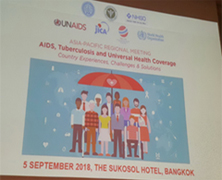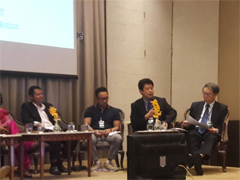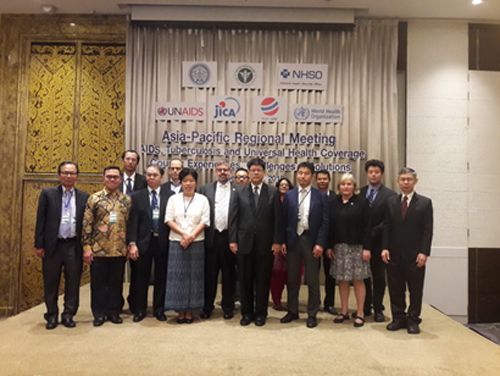Project News
2018-09-05
UNAIDS Conference



BANGKOK, 5 September 2018 - The Ministry of Foreign Affairs of Thailand, the Ministry of Public Health of Thailand, National Health Security Office, together with the Joint United Nations Programme on HIV/AIDS (UNAIDS), the Japan International Cooperation Agency (JICA)/Partnership Project for Global Health and Universal Health Coverage (GLO+UHC), and the World Health Organization (WHO) co-organized the Asia-Pacific Regional Meeting on AIDS, Tuberculosis and Universal Health Coverage: Country Experiences, Challenges & Solutions at the Sukosol Hotel, Bangkok, Thailand.
At present, some countries have already made significant progress toward inclusion of HIV/AIDS and TB in their UHC schemes, but many are still struggling with the complexities of designing effective health systems to provide adequate and affordable healthcare to their citizens. The meeting aims to raise awareness among policy-makers, practitioners, representatives of civil society, and regional and international organizations on the need to end the epidemics and achieve global health security by fostering the integration of HIV, TB, and UHC. It provided an opportunity for participants to share their views and experiences in tackling HIV/AIDS and TB through UHC and how to expand UHC schemes to include HIV/AIDS and tuberculosis.
Panelists in the event include experts from Indonesia, Cambodia, India, Japan, Thailand, WHO, and the Asia-Pacific Regional Network of People Living with HIV/AIDS.
Dr. Imran Pambudi, Program Manager, Ministry of Health of the Republic of Indonesia gave a presentation on how Indonesia transition from Global Fund support to domestically funded health systems for the national AIDS and TB programs by integrating HIV and TB into the social health insurance package. Dr. Tia Phalla, Vice-Chair of the National AIDS Authority of Cambodia, explained the need to institutionalize the role of civil society organization and private sector to ensure equitable and accessible health care. Ms. Mona Balani, Programme Officer of India HIV/AIDS Alliance, elaborated on the success of UHC implementation through a community intervention model for HIV and TB which build local ownership and accountability as well as helping improve quality and accessibility of services. In moving towards UHC, much can be gained by investing in community health workers' skills and supporting them as valued members of the health team. Dr. Peeramon Ningsanond, Director of the Bureau of Secretary General, National Health Security Office, presented a list of HIV/TB treatment and care services under UHC and stressed that the key success factors for the integration of HIV/TB program in the national UHC system include political commitment, payment design and reimbursement (centralized HIV budget on top of capitation), capacity building for health care personnel and the service system, establishment of physicians and laboratory networks, efficient drug procurement and supply, information system management, and multi-stakeholder participation. These lessons learned may be used as a tool to advocate the policy of universal health coverage (UHC) to policymakers in the other developing nations that are working towards achieving UHC inclusive of the continuum of HIV and AIDS care services. Mr. Harry Prabowo, Project Officer, Asia-Pacific Network of People Living with HIV/AIDS (APN+) stressed the need to address stigma and discrimination by a people-centered approach in which positive people are empowered to participate in all aspects of the response to HIV and AIDs. Dr. Tomohiko Makino, Chief Advisor, The Partnership Project for Global Health and UHC, gave a presentation on Japan's success story in tackling HIV/TB through UHC and reiterated that Japan has continued strengthening global advocacy and political commitment to promote UHC worldwide and endured to contribute to global HIV/TB efforts through bilateral cooperation, human resource development, and other technical assistance programmes. Dr. Daniel Kertesz, WHO Country Representative in Thailand, commended Thailand as a leader and model for other countries in achieving UHC, particularly its sustainable UHC implementation based on strong political commitment, evidence-based policy making, and civil society engagement. He further elaborated that in order to achieve the 2030 Agenda's Health for All, governments must prioritize building systems for health that provide universal access to all health services so that on one is left behind.
- About JICA
- News & Features
- Countries & Regions
- Our Work
- Thematic Issues
- Types of Assistance
- Partnerships with Other Development Partners
- Climate Change / Environmental and Social Considerations
- Evaluations
- Compliance and Anti-corruption
- Science and Technology Cooperation on Global Issues
- Research
- JICA Development Studies Program / JICA Chair
- Support for the Acceptance of Foreign HRs / Multicultural and Inclusive Community
- Publications
- Investor Relations
